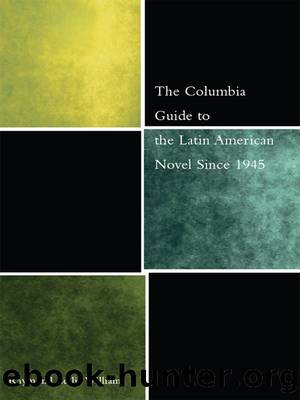The Columbia Guide to the Latin American Novel Since 1945 by Williams Raymond;

Author:Williams, Raymond;
Language: eng
Format: epub
Tags: LIT004100, Literary Criticism/Caribbean & Latin American, LIT004020, Literary Criticism/American/General
Publisher: Columbia University Press
Published: 2007-10-28T16:00:00+00:00
Dorfman, Ariel [Biography] Chilean novelist, playwright, short story writer, poet, and essayist, he became identified with Chilean writing in exile during the 1970s and 1980s. A supporter of Salvador Allendeâs Unidad Popular government in Chile in the early 1970s, he was forced into exile after the 1973 military coup. In recent years he has established an international reputation as a social critic, political activist, and essayist. Born in Argentina in 1942, he lived much of his early childhood in the United States and was later educated in his homeland of Chile, where he is a citizen. Early in his career Dorfman became known for the brilliant analysis of comic books and capitalism in his book Para leer al Pato Donald (1971, How to Read Donald Duck: Imperialist Ideology in the Disney Comic, 1975). This landmark book became a model for the study of ideology and popular culture in Latin America and did much to popularize âdependency theoryâ in U.S. academia. In his cutting-edge analysis of kinship structures in Donald Duck, Dorfman demonstrates that there is no longer genealogy and kinships are thus unnatural. After going into exile he expanded his creative efforts beyond the essay to become a prolific writer of fiction, poetry, and plays, much of which has been translated into over twenty different languages. He has been on the faculty at Duke University since the 1980s.
His fiction is comparable in several ways to the novels of writers such as Carlos Fuentes: idea driven yet constantly on the border between empirical reality and some irrational or surreal sphere of time and/or space. His novel La última canción de Manuel Sendero (1983, The Last Song of Manuel Sendero, 1988) is comparable to Fuentesâs Christopher Unborn, for both novels have a narrator who tells a story from the womb.
Selected Work: Moros en la costa (1973); La última canción de Manuel Sendero (1983, The Last Song of Manuel Sendero, translation G. R. Shivers, 1988); Viudas (1983, Widows, translation S. Kessler, 1989); Máscaras (1988, Mascara, translation by the author, 1988); Terapia (2001, Blakeâs Therapy, translation by the author, 2001).
Download
This site does not store any files on its server. We only index and link to content provided by other sites. Please contact the content providers to delete copyright contents if any and email us, we'll remove relevant links or contents immediately.
The Fine Print (Dreamland Billionaires Book 1) by Lauren Asher(2395)
Fury of Magnus by Graham McNeill(2362)
The Last House on Needless Street by Catriona Ward(2180)
The Rose Code by Kate Quinn(2073)
Malibu Rising by Taylor Jenkins Reid(1803)
Luster by Raven Leilani(1800)
Transcendent Kingdom by Yaa Gyasi(1770)
A Little Life: A Novel by Hanya Yanagihara(1743)
Moonflower Murders by Anthony Horowitz(1719)
The God of the Woods by Liz Moore(1563)
The Lost Book of the White (The Eldest Curses) by Cassandra Clare & Wesley Chu(1510)
This Changes Everything by Unknown(1421)
The Midwife Murders by James Patterson & Richard Dilallo(1377)
The Lying Life of Adults by Elena Ferrante(1348)
The New Wilderness by Diane Cook(1333)
Written in the Stars by Alexandria Bellefleur(1318)
Wandering in Strange Lands by Morgan Jerkins(1281)
Ambition and Desire: The Dangerous Life of Josephine Bonaparte by Kate Williams(1274)
The Lying Life of Adults by Elena Ferrante;(1232)
